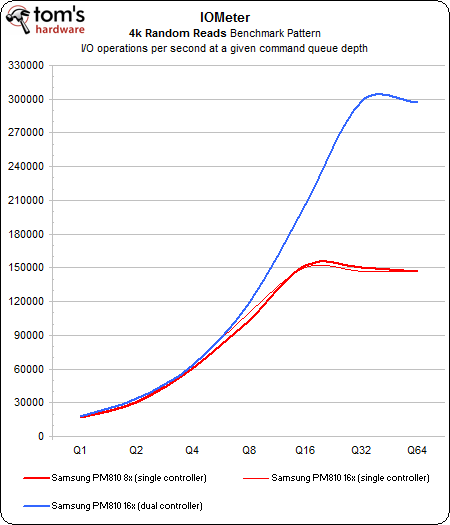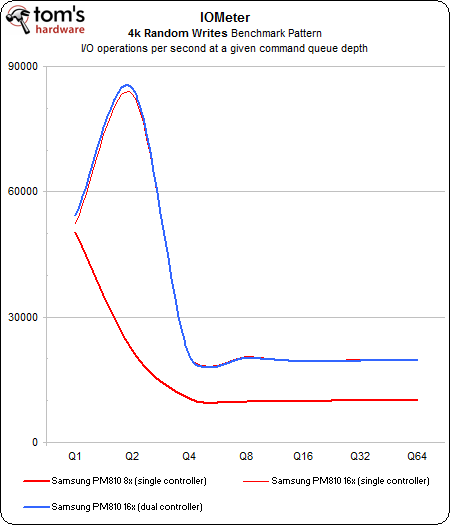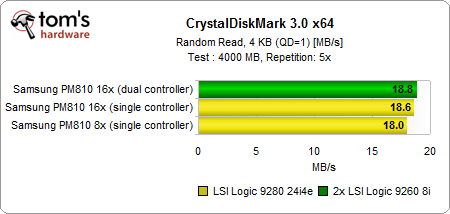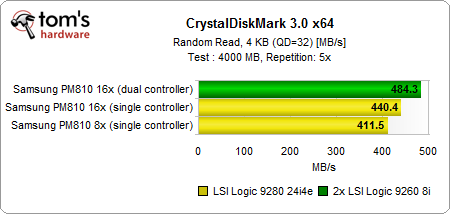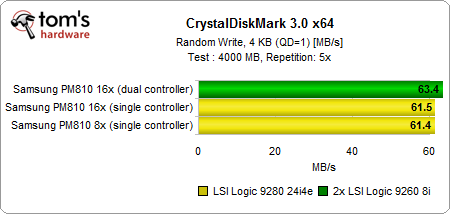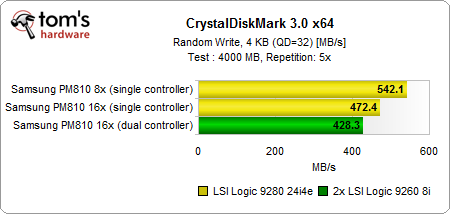A Sexy Storage Spree: The 3 GB/s Project, Revisted
We repeat our extreme SSD RAID project for the third time and arrange 16 Samsung 470-series SSDs based on MLC NAND in a RAID 0 array to reach new levels of performance. We weren't as fortunate this time, but not for the reasons you might suspect.
Get Tom's Hardware's best news and in-depth reviews, straight to your inbox.
You are now subscribed
Your newsletter sign-up was successful
Benchmark Results: 4 KB Random Reads/Writes
The higher the queue depth, the better the system performs. When we look at 4 KB random reads/writes, we see a different picture than from the Iometer benchmark. This is especially true in reads, where the dual-controller system achieves an excellent result of more than 300 000 IOPS at a queue depth of 32. The limited single-controller configurations are about half as fast. The curve shows clearly just how great an effect queue depth has on I/O operations. At QD=1, performance is below 30 000 IOPS.
In random writes, the situation is a bit different: low queue depths of up to QD=2 get the best results on the test system. The two-controller setups with 16 SSDs have a clear advantage, as this test best shows their ability to accumulate I/O performance. With only eight of the Samsung drives connected to the controller (LSI MegaRAID 9280-24i4e), the performance drops quickly, competing with the other setups only at the lowest queue depths.
In random data transfers, the RAID system is slower than at sequential reads/writes, but it still performs well. The read rate at a high queue depth is between 411.5 and 484.3 MB/s and the write rate between 428.3 and 542.1 MB/s. In contrast to the streaming benchmark, the various test systems perform very evenly in this test. Instead of differing by a factor of two in the read/write rates, the maximum difference here is only about 120 MB/s.
Get Tom's Hardware's best news and in-depth reviews, straight to your inbox.
Current page: Benchmark Results: 4 KB Random Reads/Writes
Prev Page Benchmark Results: I/O Performance Next Page Conclusion: Second-Generation 6 Gb/s Systems Needed-
burnley14 Wow, throughput in GB/s. Makes my paltry single SSD look shameful. How fast did Windows boot up out of curiosity?Reply -
the associate Overkill benches like this are awesome, I can't wait to see the crazy shit were gona have in 10 years from now.Reply
burnley14How fast did Windows boot up out of curiosity?
I'd also like to know =D -
abhinav_mall How many organs I will have to sell to get such a setup?Reply
My 3 year old Vista takes 40 painful seconds to boot. -
knowom You can use super cache/super volume on SSD's or even USB thumb drives to dramatically improve the I/O and bandwidth at the expense of using up a bit of your system ram still the results are impressive and works on HD's as well, but they suffer from access times no matter what.Reply
I don't even think I'd bother getting a SSD anymore after using super volume on a USB thumb drive and SSD the results are nearly identical regardless of which is used and thumb drives are portable and cheaper for the density you get for some messed up reason. -
knowom I'd be really interested to see super cache/super volume used on this raid array actually it can probably boost it further or should be able to in theory.Reply -
x3style abhinav_mallHow many organs I will have to sell to get such a setup?My 3 year old Vista takes 40 painful seconds to boot.Wow people still use vista? Was that even an OS? It felt like some beta test thing.Reply -
nitrium I suspect you'll all be VERY disappointed at how long Windows takes to boot (but I'd also like to know). Unfortunately, most operations in Windows (such as loading apps, games, booting, etc) occur at QD 1 (average is about QD 1.04, QD > 4 are rare). As you can see on Page 7, at QD1 it only gets about 19 MB/sec - the SAME speed as basically any decent single SSD manufactured in the last 3 years.Reply -
kkiddu mayankleoboy1holy shit! thats fast. how about giving them as a contest prize?Reply
I WANT 16 OF THOSE !
For God's sake, that's $7000 worth of hardware, not including the PC. DAMN DAMN DAMN !! 3 gigabytes per second. And to think, that while on dial-up 4 years back, I downloaded at 3 kilobytes per second (Actually it was more like 2.5 KB/s).
